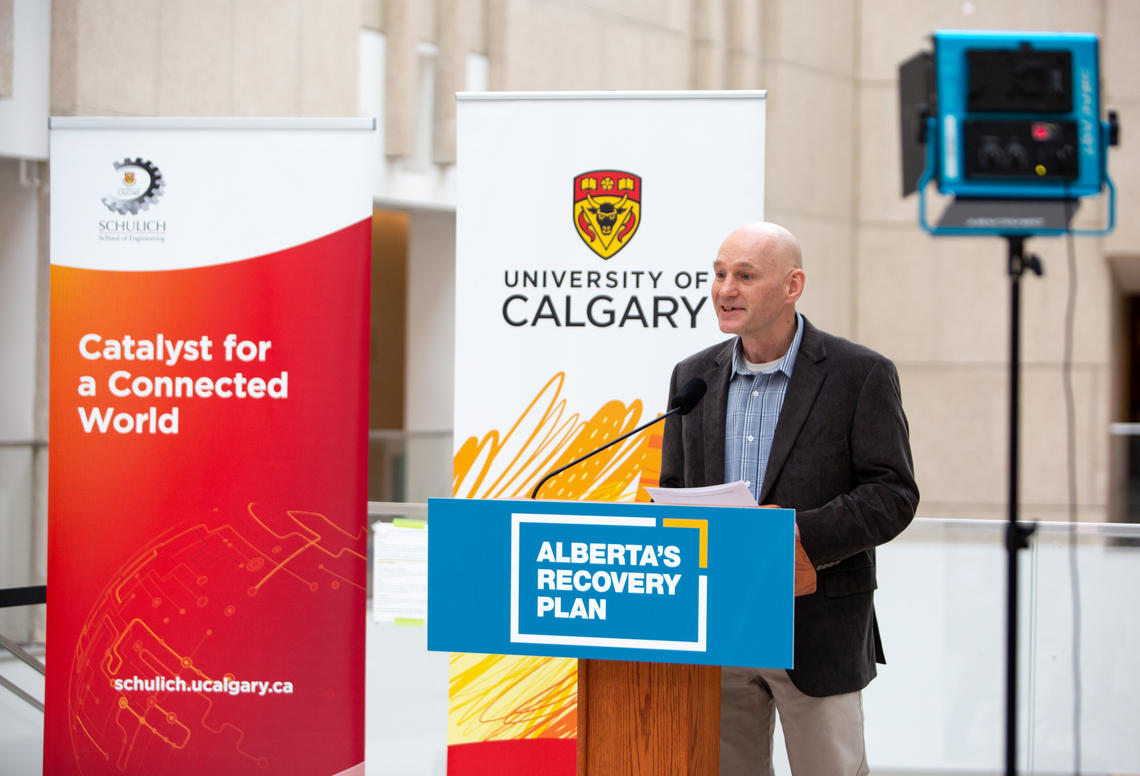March 18, 2022
Provincial funding earmarked for UCalgary clean-energy projects

Clean-energy technology has been at the forefront of discussions around Alberta’s energy transition and now two major related projects at the Schulich School of Engineering have been recognized as part of a newly announced $13-million investment by the Government of Alberta.
Dr. Edward (Ted) Roberts, PhD, will receive $307,000 to continue his work on graphene modification to improve electricity grid capacity, while Dr. Zhangxing (John) Chen, PhD, is getting $257,000 as he investigates how digital technology can help reservoir interpretation and production prediction.
The provincial funds will be split among 22 projects through Alberta Innovates, including 13 through the Digital Innovation in Clean Energy (DICE) program and nine through the Clean Resources business unit.
With these investments, University of Calgary researchers will continue to reimagine the energy landscape to help Alberta’s energy sector grow, diversify, and become even more sustainable.
- UCalgary President Ed McCauley
“We thank the Government of Alberta and Alberta Innovates for their confidence in our scholars and their ability to drive energy technology innovation for our low-carbon future.”
Improving battery performance
Roberts recently discovered that one small change to a battery membrane can have a big impact on redox flow batteries (RFBs), which store electrical energy in liquids that are pumped through the battery.

Ted Roberts will receive $307,000 to continue his work on graphene modification to improve electricity grid capacity,
Riley Brandt, University of Calgary
He modified the membrane with graphene, which is a unique carbon material measuring only one atom thick, improving the battery’s efficiency and power density.
When the wind blows or sun shines, the redux flow batteries are charged up and store the excess energy from wind turbines and solar panels, Roberts explains.
“With the growing use of renewable energy, there’s an increasing global demand for this kind of energy storage,” he says. “Through this Alberta Innovates-funded project, we’re working to optimize this technology, to scale it up, and test it in commercial batteries.”
Roberts adds he’s most excited about seeing his work go “from the laboratory to industrial use.”
Harnessing tech in the energy sector
Chen is also excited about what lies ahead in the technological evolution of the province’s economy.
His research is focused on developing a machine-learning reservoir analysis framework to make sure that reservoir interpretation and classification, as well as effective prediction of subsurface reservoir behaviours can be accurately and efficiently calculated.
Digital technologies like big data, artificial intelligence, virtual reality and augmented reality are being utilized in his work.
“This technology will be applied to hydrocarbon, geothermal and hydrogen energy production as well as carbon capture and sequestration,” Chen says. “All of this technology is starting to be used in industry and will lead to more social and economic benefits and job opportunities.”

John Chen, receives $257,000 as he investigates how digital technology can help reservoir interpretation and production prediction.
Joe McFarland, Schulich School of Engineering
Diversifying the future
Roberts, Chen and their research colleagues around the province are hoping their work will also create a cleaner environment.
Some of the other projects being funded by the province include reducing building utility costs and emissions with digital transformation software; augmented intelligence to lower carbon dioxide emissions; and the engineering and development of asphalt from Alberta bitumen.
“We are boosting diversification in key growth sectors, like technology and innovation, as we double down on Alberta’s role in a responsible global energy future by diversifying our energy sector,” says Doug Schweitzer, minister of jobs, economy and innovation. “Working with Alberta Innovates and researchers, we will develop clean technologies that will diversify our economy, attract investment and create jobs.”
Alberta Innovates CEO Laura Kilcrease says the new economy will create “incredible opportunities” in the clean-tech sector.
“Growing a mature clean technology industry in Alberta takes dedication and resources,” she says. “We are pleased to provide support for the Clean Resources’ projects that demonstrate a clear path to helping Alberta meet its Net Zero goals, as well as those unique innovations in the Digital Innovations in Clean Energy program.”






